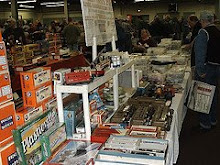G scale is a scale for model railways, and because of its size and durability, G scale is often used outdoors. Such installations are known as garden railways.
G scale was introduced by Ernst Paul Lehmann Patentwerk under their brand name of LGB, meant for indoor/outdoor use. Lehman was, until its recent bankruptcy, the major European manufacturer of G scale trains, and considered the one that really made garden railways popular. Their trains are sold as the Lehmann Gross Bahn (or "Lehmann Big Train"). Lehman Patentwerk was founded in 1881 and started producing LGB in 1968. The remains of the company, subject to seemingly endless litigation, have been bought by Maerklin, and production of certain items seems to be continuing. The US side of the company, known formerly as LGB of America [LGBoA], has somewhat less clear position in the newly-arranged company under the Maerklin aegis. LGB produces models of European and US originals, of steam, diesel and electric prototypes as well as a large range of coaches, trucks and accessories.
The term "scale" is a misnomer, as the actual scale of the trains that run on it vary from system to system, country to country. G scale is more correctly called "G Gauge", as the gauge of the track, 45 mm or about 1.75 inches, is the one consistency.
The name comes from the German groß (meaning "big"). Traditionally, G scale is the use of 45 mm gauge track, as used for standard gauge (Gauge 1) models, for modelling 1,000 mm (3 ft 3⅜ in) narrow gauge railways, using the correct scale of 1:22.5. Metre gauge is the most common narrow gauge in Europe, where it is known as IIm.
Some people think that the "G" in G Scale stands for Garden Scale This is also a misnomer, but the term Garden Trains has picked up usage over the last several years in the media to describe G Scale Trains.
In the United States, the commonly used narrow gauge is 3 feet; modelling this correctly with a 45 mm track gauge gives a scale of 1:20.3, which is commonly used by American manufacturers. In actuality, these are called G Scale, even though in reality they are not. Some modellers and train producers call 1:20.3 "F scale".
Other scales are used to model other narrow gauges.
Gn15 modelers use 1:24 scale parts and details along with HO/00 scale track (16.5 mm gauge) to model 15 inch gauge railroads, otherwise known as minimum gauge.
Although some call models of standard gauge equipment to 45 mm track gauge 'G scale', these models are more correctly referred to as Gauge 1, I Scale (NEM Standard 010), or 3/8" scale (NMRA S-1).
LGB and several other manufacturers produce track made of brass which can remain outside in all weathers – a quick wipe and it is ready for use. Track can also be obtained in less expensive aluminium as well as oxidation-resistant, though more expensive, stainless steel.
Thursday, July 24, 2008
Subscribe to:
Post Comments (Atom)





No comments:
Post a Comment